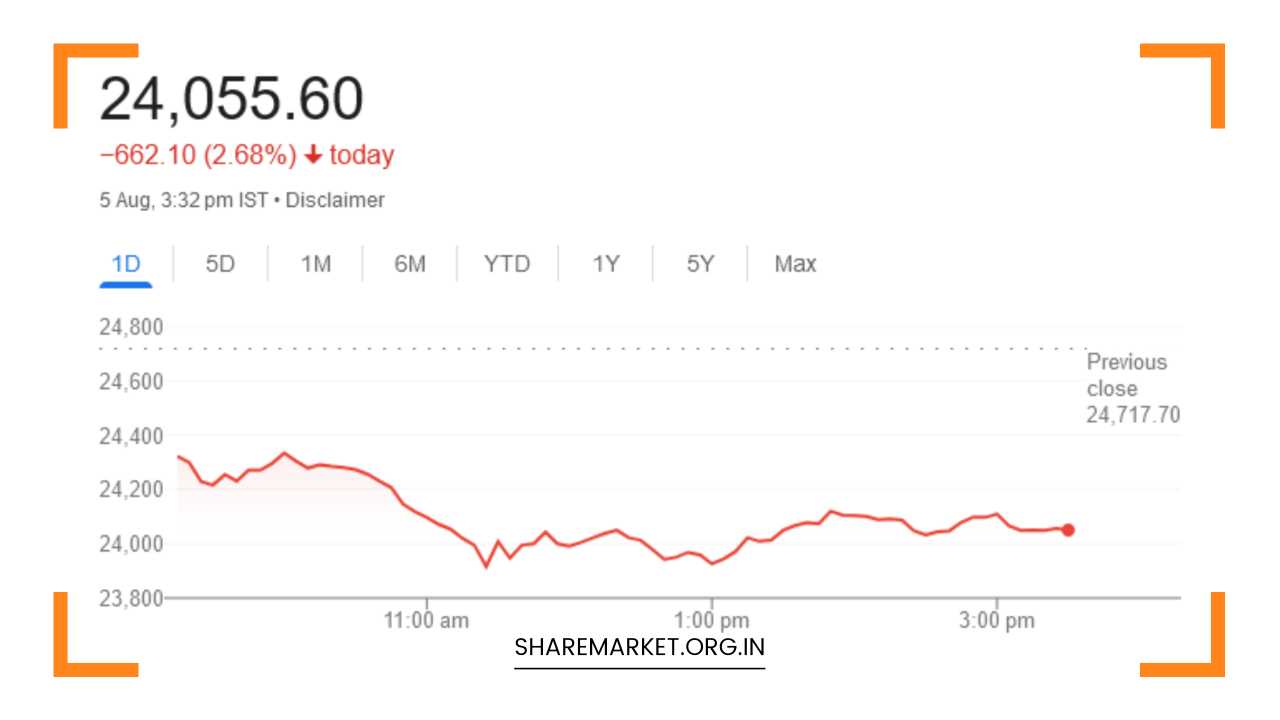Sensex, Nifty down by almost 3%; Nifty Prediction for Tomorrow

Nifty Prediction for Tomorrow
Sensex, Nifty Plunge Nearly 3%; Market Jittery Amidst Global Concerns
A significant selloff swept through the Indian equity markets on August 5, as the benchmark indices, Sensex and Nifty, experienced a sharp decline of nearly 3% each.
The broader market indices, Midcap and Smallcap, were hit even harder, with losses of 3.5% and 4% respectively.
Share Market Today
The BSE Sensex concluded the trading day at 78,759.40, down by a striking 2,222.55 points. Similarly, the Nifty closed at 24,055.60, marking a drop of 662.10 points.
The market breadth was overwhelmingly negative, reflecting the pervasive bearish sentiment. Out of the total stocks traded, only 471 advanced while a staggering 3,082 declined.
Key Contributors to the Decline
Several heavyweight stocks contributed significantly to the market downturn. Tata Motors, Adani Ports, ONGC, Hindalco, and Tata Steel were among the primary laggards, dragging the indices lower.
Despite the overall negative sentiment, a few stocks managed to show resilience. Hindustan Unilever (HUL), Nestle, Tata Consumer, and HDFC Life were among those that fared relatively better in the turbulent market.
Sectoral Performance
All sectoral indices closed in the red, underscoring the broad-based nature of the selloff. Key sectors such as auto, metal, capital goods, oil and gas, power, media, and realty were particularly hard-hit.
- Auto Sector: This sector faced significant selling pressure due to rising input costs and concerns over slowing demand. Major players in the auto industry struggled as investor confidence waned.
- Metal Sector: Metal stocks saw a sharp decline driven by weak global commodity prices and fears of a potential slowdown in economic activity.
- Oil and Gas Sector: Concerns over a possible global recession and its impact on crude oil demand weighed heavily on oil and gas stocks.
- Power Sector: The power sector also experienced notable selling pressure, primarily due to regulatory uncertainties and rising input costs.
Global Factors Impacting Indian Markets
The steep decline in the Indian equity markets can be attributed to a confluence of global factors. Key among these are:
- End of Yen Carry Trades: The unwinding of yen carry trades, a popular strategy for investors seeking higher returns by borrowing in yen and investing in higher-yield assets, contributed to market volatility.
- Fears of a US Recession: Escalating concerns about a potential recession in the US added to the global market jitters, affecting investor sentiment worldwide.
- Geopolitical Tensions: Rising geopolitical tensions further exacerbated market anxiety, creating a challenging environment for equity markets globally.
As an open economy, India is not insulated from these global developments. The interconnectedness of global financial markets means that adverse international conditions can significantly impact domestic equity markets.
Technical Analysis
The Nifty’s breach of its 50-day Exponential Moving Average (EMA) support level added to the negative sentiment.
The 50-day EMA is a crucial technical indicator that many investors rely on as a support level. Its breakdown has raised concerns about potential further declines in the index.
Jatin Gedia from Sharekhan highlighted that the Nifty’s decisive break below its 20-day Moving Average indicated a potential retracement of the recent rally.
He recommended paying close attention to key support and resistance levels to navigate the volatile market conditions.
Expert Opinions
Several market experts shared their views on the current market situation:
- Ajit Mishra, Religare Broking: Mishra emphasized the heightened volatility in the market and advised investors to adopt a cautious approach. He suggested implementing hedging strategies to protect portfolios from potential losses. Despite the short-term challenges, Mishra maintained a positive outlook on the long-term prospects of the Indian equity market, recommending that investors consider buying quality stocks during this correction.
- Vinod Nair, Geojit Financial Services: Nair highlighted India’s strong economic fundamentals and its potential to outperform global markets over the long term. He pointed to the country’s robust GDP growth prospects, bolstered by supportive government policies and a favorable business environment.
Banking Sector Performance
The banking index, Bank Nifty, also joined the selloff, breaching its previous swing low and signaling further downside potential.
This weakness in the banking sector intensified the overall market decline, reflecting broader concerns about the economic outlook and financial stability.
Investor Sentiment
Investor sentiment turned notably bearish amid the market plunge. Retail investors, often influenced by market trends, joined institutional investors in liquidating their positions.
The fear of additional losses prompted many investors to adopt a defensive stance, further exacerbating the market decline.
Market Prediction
The short-term outlook for the Indian equity market remains uncertain, as global factors continue to exert pressure.
The ongoing geopolitical tensions, combined with the risk of a global recession, are likely to lead to increased market volatility.
However, despite these challenges, India’s strong economic fundamentals and supportive government policies provide a buffer against global headwinds.
The country’s robust economic growth prospects and favorable business environment are expected to support the equity market over the long term.
Investment Strategies
In light of the current market conditions, investors are advised to maintain a long-term perspective and avoid making impulsive decisions based on short-term market fluctuations.
A well-diversified portfolio and a disciplined investment approach can help mitigate risks during periods of heightened market volatility.
Final Remarks
The recent sharp decline in the Indian equity markets, driven by a combination of global and domestic factors, underscores the need for cautious and informed investment strategies.
While the short-term outlook may be challenging, India’s strong economic fundamentals and long-term growth prospects provide a foundation for potential recovery.
Investors are encouraged to stay informed, consult financial advisors, and adopt strategies that align with their long-term financial goals. A focus on quality stocks and diversification can help navigate the uncertainties of the current market environment.
Disclaimer: This article is intended for informational purposes only and should not be construed as financial advice. Investors should conduct their own research or consult with a financial advisor before making any investment decisions.

















